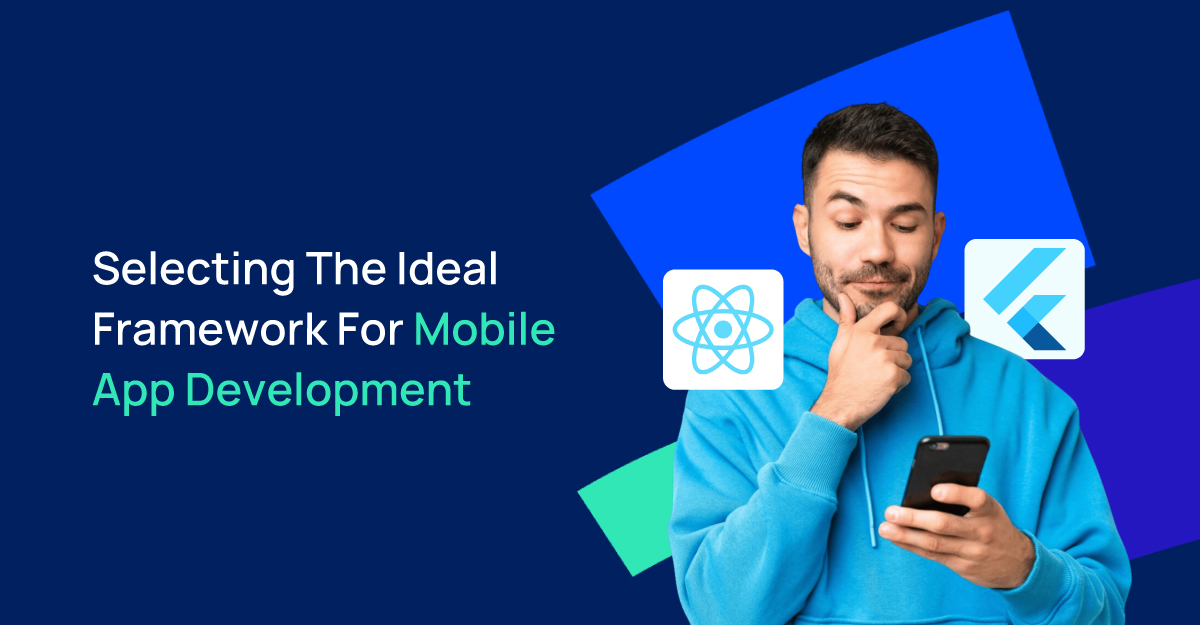The durability and reliability of mobile app development depend on a solid foundation. The cost, quality, and scalability of developing an app are all impacted by choosing the best framework, which is a choice made jointly by developers and corporate members. The choice of the best technology to invest in is made jointly by the developers and custom mobile app development services. Let's further swoop into it.
Factors To Consider Before Choosing A Framework
- Framework Cost
Consider the entire cost and benefit of the technology stack investment. Spending more money on tools may speed up the creation of your product, but if those tools aren't customizable, employing them has disadvantages as well. The correct tech stack will provide the product with high quality and at a reasonable cost, finishing the task swiftly and adding value over time.
- Framework Execution
Since the user performance entirely depends on the framework, choose it with extreme caution. Take into account the framework that offers excellent speed and reduces load times.
- Cross-Platform Support
When selecting a framework, compatibility is important. A mobile application development company or any independent developer should have a framework that works with the mobile operating systems that you want to create your app.
- Professional Help
Best practices seem to be available for the team to use in new frameworks. The newest tech stack or technology will require time investment from you. The new technology hasn't been thoroughly examined, so it might pose risks and cause issues. However, you rely on inefficient technology since the designers will have the knowledge to cut corners.
- User-friendly
The satisfaction of the customer fuels demand and sustains the company. The excellent experience also enables the product's introduction. The flexibility to offer fresh experiences and updates enables users to provide quicker feedback to enhance the product.
- Appealing UI and UX
Consider the purpose of the firm and the tech stack utilized to create a single mobile app in order to realize a company's goal. Examine the tech procedure rapidly and affordably for massive data volumes. The capacity of the technology to satisfy demands and advance the vision might be hampered by bad decision-making; therefore, choose technologies strategically and technically. Use Java, Objective-C/SWIFT, the iOS or Android platforms, or both.
Mobile Apps And Their Best Features
- Native Apps
Native mobile applications are created in a platform-specific programming language and are intended to operate on certain mobile platforms. For iOS apps, Objective-C and Swift are employed, but Kotlin and Java are chosen for Android apps. Each platform includes specific SDKs, interface components, and development tools. It is not possible to create native apps that can be downloaded or used on both iOS and Android devices. Pokémon Go, Spotify, and WhatsApp are a few examples of native apps. However, neither the App Store nor iPhone devices will carry apps created for iOS or Android.
- Web Apps
A website generally provides information, but a web app provides additional participation and functionality. Web applications may operate on any browser and device, including iOS and Android, and are developed using web application frameworks. They may be loaded in any browser, including Safari, Chrome, and Firefox, and frequently employ programming languages like CSS and HTML. Since they take up no space on the user's device, web applications are a popular option for businesses. The development of web apps is a strong and affordable method for exhibiting goods and services to a large audience. In order to deliver mobile-friendly content across all devices and browsers, every mobile app development agency or organization should spend more and more on web app development tactics.
- Hybrid Apps
Users may download and install hybrid mobile apps that combine the finest features of native and online apps. These applications run on a web view and are created with HTML, CSS, or JavaScript. They enable the distribution of the same codebase across many platforms since they are platform-neutral and cross-platform-compatible. The finest hybrid application development frameworks are used to create hybrid apps, enabling the same program to run on both iOS and Android platforms. By making the hybrid app available on popular platforms and gaining access to specialized development tools, SDKs, and interface components like native applications, businesses may increase the reach of their products. Important hybrid app examples include Evernote, Gmail, Uber, and Instagram.
Framework for Mobile Application Development Company
- Flutter
The open-source Flutter mobile app development platform from Google enables the building of native Android and iOS applications. The best and most dependable smartphone UI framework for generating interesting apps rapidly and speeding up development is Flutter. Developer tools, widgets, a rendering engine, debugging, and API connectivity are all provided.
- Xamarin
Native apps for Android, iOS, tvOS, watchOS, macOS, and Windows may be made using the free, open-source Xamarin platform. It offers cheaper maintenance, diagnostic tools, and support for wearable smart devices like the Apple Watch and Android Wear. However, it has drawbacks, including a high application size, few libraries, and security issues.
- React Native
React Native is a free, open-source framework for building cross-platform applications that enables the construction of platform-specific versions of many functionalities. The ease of using a single codebase across multiple platforms makes it popular among programmers.
- Swiftic
With a user-friendly UI, CMS integration, customized app creation, and third-party integration, Swiftic is a no-code mobile app development solution designed specifically for iOS devices. Team management, location-based features, a wide range of design possibilities, compatibility for Windows Mobile, an expensive builder, and API options are all missing, nevertheless.
- Ionic
For developing hybrid mobile applications that combine web technologies to produce powerful, personalized apps, Ionic is an open-source framework. Access to host operating features like the camera, GPS, and flashlight is made possible by this wrapping Angular Framework. It provides a single code programming language, effortless flexibility, cross-platform interoperability, a beautiful user interface, and community involvement.
Conclusion
The selection of a framework for mobile app development services is a significant decision that includes taking into account a number of aspects, including the app's end goal, needs, difficulties, benefits, and compatibility with the application's vital components, such as speed, security, performance, and scalability. The selection procedure plays a key role in determining how the app will evolve and function. Consider consulting a professional mobile app development company in India if you're not sure which framework is suitable for your organization. The framework you choose ultimately determines how the app will affect the final product for your business.



